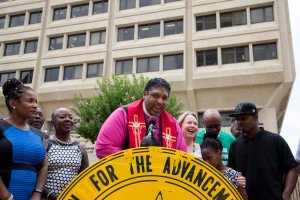Closing arguments are set to begin this afternoon in the closely watched federal trial on North Carolina’s photo ID requirement. Closing arguments to begin in voter ID trial:
 Janet Thornton, a labor economist at Economic Research Services in Florida, was the last witness that state attorneys called. Plaintiffs, including the N.C. NAACP, rested their case Thursday.
Janet Thornton, a labor economist at Economic Research Services in Florida, was the last witness that state attorneys called. Plaintiffs, including the N.C. NAACP, rested their case Thursday.
The photo ID requirement was passed in 2013 as part of a sweeping elections law that state Republican legislators pushed soon after the U.S. Supreme Court invalidated a key section of the Voting Rights Act of 1965. That section required mostly southern states and 40 counties in North Carolina to seek federal approval of major changes in elections laws.
Voting rights activists consider North Carolina’s election law, known as the Voter Information Verification Act, to be one of the most restrictive in the country. The photo ID requirement didn’t take effect until this year and was amended last year just weeks before a federal trial on other provisions of the law.
The N.C. NAACP, the U.S. Department of Justice and others filed a federal lawsuit in 2013, alleging that the elections law places undue burdens on blacks and Hispanics, is unconstitutional and violates the Voting Rights Act of 1965.


